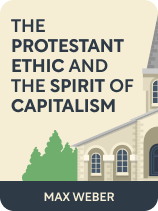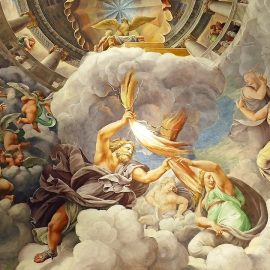

This article is an excerpt from the Shortform book guide to "The Protestant Ethic and the Spirit of Capitalism" by Max Weber. Shortform has the world's best summaries and analyses of books you should be reading.
Like this article? Sign up for a free trial here.
What is the Protestant work ethic? Why is American culture so focused on “hustle” and productivity, in contrast to many European nations’ laid-back attitudes?
As far back as the 1600s, Anglo-American Protestants ceased the traditional lifestyle of working just enough to sustain their lives. They began to work harder, longer, and more systematically than anyone had before. In The Protestant Ethic and the Spirit of Capitalism, Max Weber explores the reasons behind this change.
Continue reading to learn how and why Protestants broke away from the traditional economic lifestyle and blazed a new trail.
The Protestant Work Ethic
What is the Protestant work ethic? To understand it, Weber takes us on a historical journey. He explains that, with the dawn of Calvinism in the mid-1500s, achieving grace meant you were (probably) saved. So, the most important thing in a Protestant’s life became proving their state of grace. They wanted to prove this to themselves and their community. To prove it to themselves was to end their existential anxiety; to prove it to the community was to secure high social standing.
To achieve this, Weber argues that Protestants began to live ascetic, systematic lives in order to attain the state of grace (following the example of Catholic monks, except in the secular world). In plain language, the ideal Protestant had strict daily routines, habits, and standards of moral conduct.
Fueled by existential anxiety, Calvinist Protestants became the first rational, systematic middle class of skilled workers and entrepreneurs. Specifically, Weber focuses on the lifestyles of the Puritans, the main sect of Anglo-American Calvinists in the 1600s.
(Shortform note: The Puritans were a sect of Protestants who originated in England in the 1600s. They split into two groups: non-separatists and separatists. Non-separatist Puritans wanted to reform the Church of England by removing any remaining vestiges of Catholicism and to spread their way of life throughout the nation. Separatist Puritans—also known as the Pilgrims—established settlements in the American colony of New England. Lacking any opposition to their way of life, these American Puritans successfully built religious communities that gave the elect exclusive power to vote and rule the church.)
Weber emphasizes that the ambition of the Calvinists was a big break from tradition. Previously, people worked only as long as they needed to earn enough money for food and housing. People considered it immoral to chase more money than you needed, and early entrepreneurs had a hard time getting workers to labor for longer hours. Offer higher wages, and they’d work less to earn the same amount. Impose lower wages, and you’d cut productivity and hurt your own business.
According to Weber, this was not the case with the Calvinists. They saw tireless work in their callings as the highest moral good: Work was the end in itself. Consequently, they made better business owners and better workers. They would work longer and do a better job, because they saw their every action as serving to glorify God. This shift was one key to the rise of the “spirit of capitalism”: People became willing to work for the work itself.
(Shortform note: Because the Protestant ethic induced people to feel that they should work hard, it was useful to those who owned the means of production. Thus, the wealthy had an incentive to maintain the belief that more labor means more good. In the past, this may have been true—an industrializing society does need large amounts of raw labor to develop. More recently, however, some argue that more labor no longer produces more good: In a post-industrial society, we no longer need to labor constantly to procure enough food, shelter, and material comfort for everyone.)
Richard Baxter and the Question of Wealth
Weber goes on to explain that, through this ambition, some Puritans became wealthy: Since they were hardworking, diligent, and frugal, they naturally made money. However, Christians traditionally saw the pursuit of wealth as immoral, so the financial success of these Puritans conflicted with their religious ideals. Part of their solution to this issue was to avoid indulging in material pleasures—food, drink, and luxury goods—and to give to the church.
(Shortform note: In the Middle Ages, Christians believed in a demon called Mammon, who had fallen from heaven due to his immense greed. Superstitions around Mammon held that he tempted men with promises of wealth, preying on people prone to greed. In the Sermon on the Mount, Jesus is said to have taught that “no man can serve two masters… Ye cannot serve God and Mammon.” This declaration shaped the Christian view of material wealth as unimportant compared to spiritual obedience to God.)
According to Weber, the full solution to the question of wealth came from Richard Baxter, a prominent English and Puritan theologian. Baxter taught that becoming wealthy was justified under the right conditions, reasoning as follows:
- If you became wealthy in the course of working your calling for God’s glory, that meant that God favored you.
- Further, if God presented you with the chance to profit, it was your moral duty to take advantage of the opportunity.
So long as your wealth was a byproduct of your faithful work for God, it was okay. In other words, it became morally acceptable—even encouraged—to get wealthy for God’s glory. In this way, Weber argued that wealth became associated with the state of grace (God’s favor).
Seeing that God favored them, the wealthy now considered themselves elect (saved). This further reinforced the idea that pursuing wealth was a morally upright act, though the wealthy remained ascetic and avoided indulging.
| The Prosperity Gospel: Modern Christians on Wealth Today, some Christian teachings on wealth are enmeshed with capitalist ideals of material success. Namely, some evangelical church leaders, such as Joel Osteen, preach the “prosperity gospel,” a loosely Bible-based ideology that says God wants to make his followers wealthy. These teachings lose much of the religious foundations explained above in favor of an easy, feel-good stance that reconciles God and wealth as follows: You can believe yourself into positive changes—your mind and thoughts influence your material reality. God rewards his faithful in direct, materially manifested ways—such as by giving miracle cures or financial success. Drawing from the Protestant ethic: It’s your duty to work hard and faithfully for God. Together, these ideas produce the belief that if you work hard and believe you’ll get rich, God will reward you with great wealth. This has been used to justify inequality; it implies that if you aren’t rich, it’s your own fault. Donald Trump is a notable adherent of this message. He was raised Presbyterian (a Protestant sect) in a church ministered to by Norman Vincent Peale, author of The Power of Positive Thinking, and who Trump has praised as being influential in his life. Peale admired and supported American businessmen, such as Fred Trump, and preached a practical (rather than spiritual) message. |
Wealthy Puritans Began to Accumulate Capital
With the moral confusion around wealth resolved, one problem remained: What should people do with their accumulating wealth? Since the Puritans’ rational, ascetic lifestyles prohibited “instinctive” or “animal” indulgences, many pastors advised reinvestment. So, Weber says, wealthy Protestants would put the money back into their own businesses and invest in others through the early stock markets.
In turn, this allowed them to expand their businesses. The more they reinvested, the more they accumulated capital—such as money, property, and goods. More capital meant more ability to expand, and so on in a self-reinforcing feedback loop. This, Weber argues, was the beginning of the capital accumulation and investment activity that was necessary to the onset of modern capitalism.
(Shortform note: Investment activity didn’t originate with the Protestants; rather, they expanded upon previous financial practices with meticulous, systematic work and investment. Stock exchanges appeared in the United States toward the end of the 1700s—in 1790, the Philadelphia Stock Exchange was founded, and 1792 saw the New York Stock Exchange come into being. Even earlier, Belgium had a stock exchange in Antwerp that dealt primarily in government bonds, and Venetian moneylenders bought and sold debts in the 1300s.)
Since these Puritans saw themselves as working for God’s glory, they felt morally justified in building large enterprises. Further, they saw themselves as upstanding contributors to the wealth and prosperity of God’s community on Earth.
(Shortform note: Weber doesn’t mention the role of slavery in powering the American colonial economy. New England had a high concentration of slaves—both Native Americans and Africans—who were integral to the construction of cities and powered most economic activity. Colonists also invested in the slave trade. In leaving out this detail, Weber’s argument misses the historical reality that European colonists exploited other humans to build their wealth and didn’t do it through sheer work ethic.)
Weber’s Ideal Protestant
To recap, Weber characterizes the ideal Protestant as someone who rose early, lived simply, and worked systematically throughout the day. He ate simply and rested just enough to maintain his health and get back to work. He followed strict routines, and he constantly examined his conduct to see whether he was living up to Biblical ideals.
The ideal Protestant wouldn’t drink, play sports, or socialize idly; he saw time not used to glorify God as time wasted. He contributed practically to his secular community, faithfully attended church, and reinvested any profits from his calling. In essence, he became a prosperous, religious, middle-class citizen. This way of life is what Weber calls “the Protestant ethic.”
(Shortform note: The description above illustrates one of Weber’s famous concepts: his notion of “ideal types.” An ideal type is an abstract, logically consistent version of something that is, in reality, more complicated. For instance, you could posit an ideal type for a millennial American tech entrepreneur—think of the stereotype of “tech bros.” In reality, nobody would fit that model perfectly; Weber’s point is that it’s a useful shorthand when you need to quickly refer to something complex within a larger argument.)
Exercise: How Does the Protestant Ethic Show Up in Your Life?
According to Weber, the Protestant ethic gave rise to the lifestyle and moral beliefs of 20th-century capitalists. While that lifestyle has continued to change in the time since Weber wrote The Protestant Ethic, its core features still show up throughout life today. Below, reflect and draw connections to your own experience.
- According to Weber, part of the spirit of capitalism is adherence to a rigorous and systematic way of life. How does your own relationship to work and productivity relate to these ideas? (For instance, you might put a lot of effort into building good habits in order to be more efficient.)
- Weber notes that, to the early Protestants, idleness meant waste and sin because that time could be spent glorifying God instead of relaxing. Today, many people struggle to feel okay with time spent unproductively. On a usual day, how do you tend to feel about being unproductive?
- If you struggle with taking downtime and being unproductive, it might help to know that it’s in part because you’ve inherited the echoes of a zealous, centuries-old religious doctrine. Knowing this, what specific action could you take to change how you relate to idle time? (For instance, you might remind yourself that rest is just as important as work if you want a balanced life.)
- Another major influence of the spirit of capitalism is our modern-day fixation on habits and systematic living. It’s easy to feel bad when we’re less-than-perfect with our daily routines. However, people only started living like this in the last few hundred years. Knowing this, what specific mantra or reminder could you give yourself when you come up short with your habits? (For example, you might note that today, many of us build habits alone, while the Protestants had the pressure of an entire religious community to push them along.)

———End of Preview———
Like what you just read? Read the rest of the world's best book summary and analysis of Max Weber's "The Protestant Ethic and the Spirit of Capitalism" at Shortform.
Here's what you'll find in our full The Protestant Ethic and the Spirit of Capitalism summary:
- How the Protestant way of life lead to modern capitalism
- The history of the 16th-century Protestant reformation
- Why the Protestants were so distinctly prosperous






